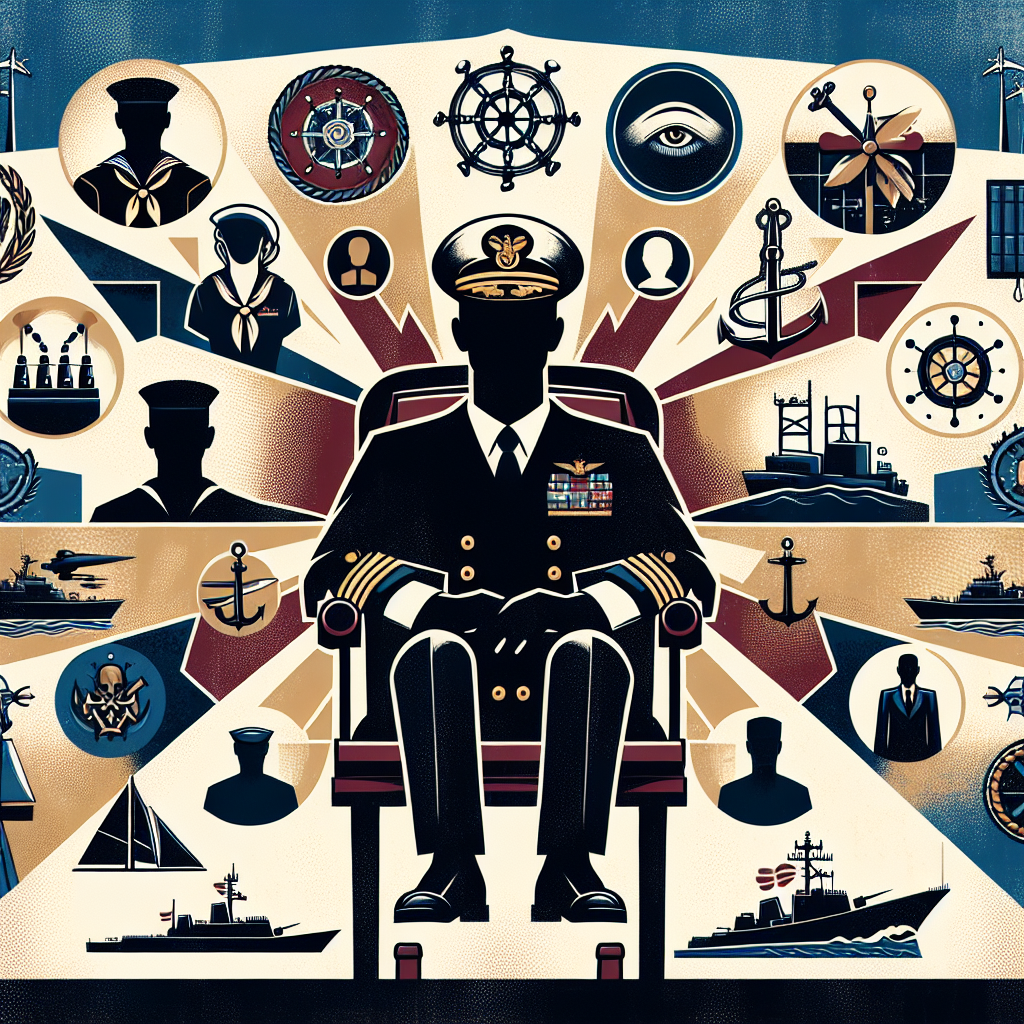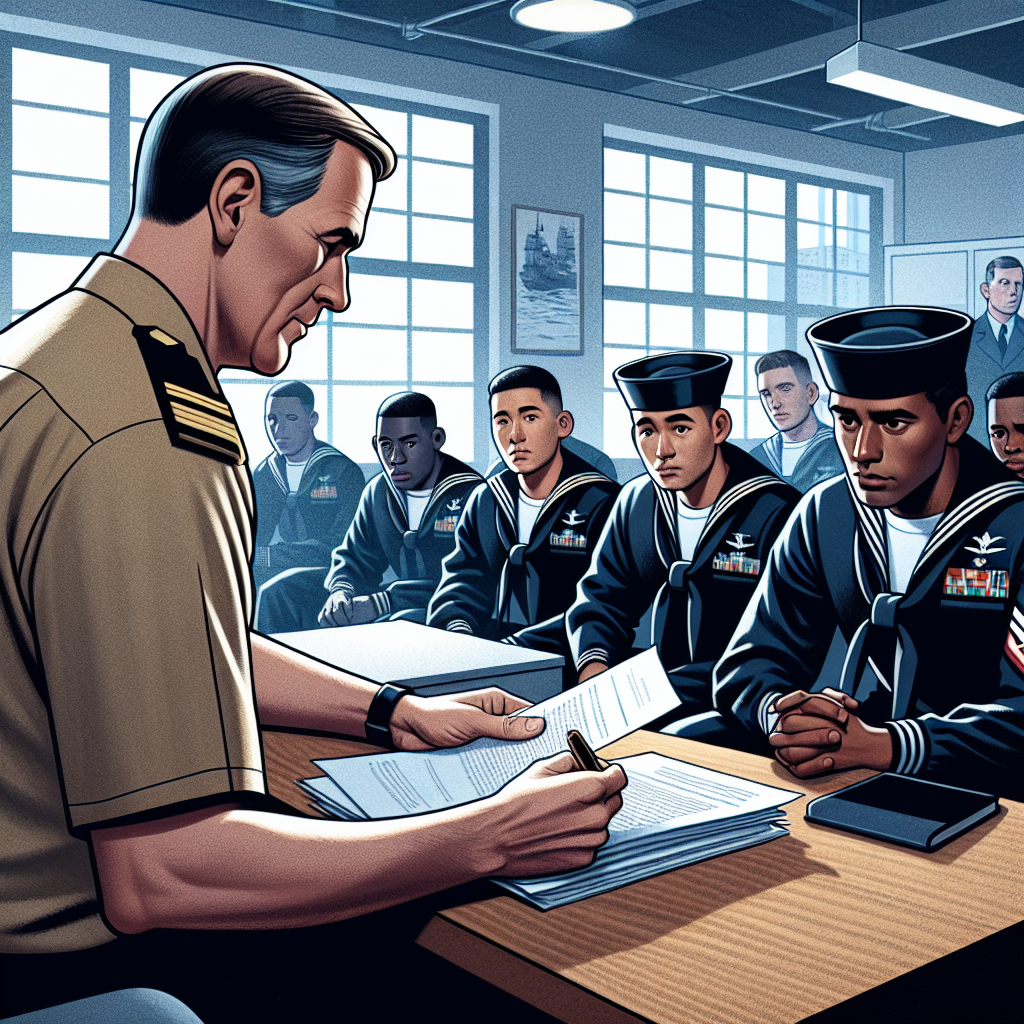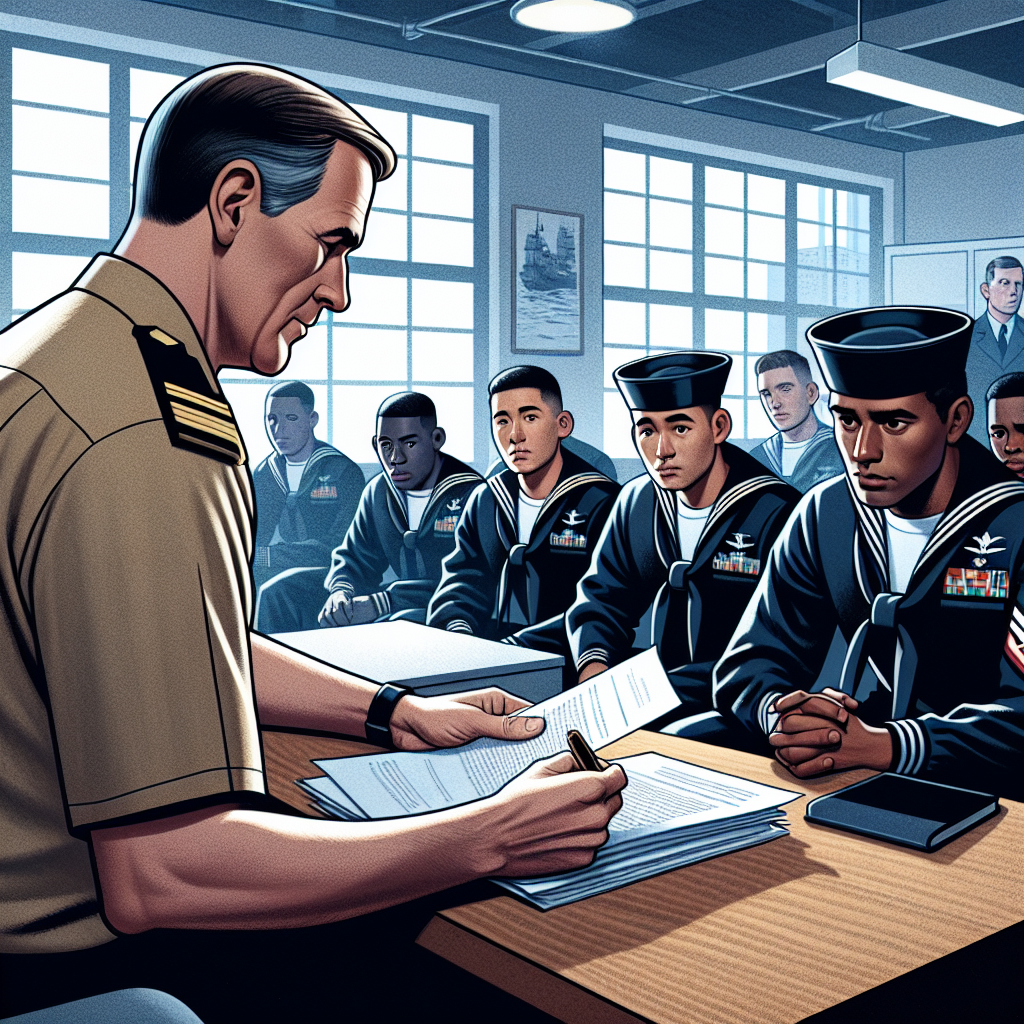Commanding Officers Are Permitted To Advance Sailors
So you’ve heard about commanding officers having the power to promote sailors, but what does that really mean? Well, it turns out that commanding officers do have the authority to advance the ranks of their sailors, and it’s not just some ceremonial gesture. This article will explore how commanding officers are able to make these promotions and what it means for the sailors who receive them. Get ready to uncover the power dynamics behind these advancements and how they can shape a sailor’s career in the military.

Understanding Naval Advancement
Definition of Naval Advancement
Naval advancement refers to the process by which sailors progress in their careers within the naval forces. It encompasses the various opportunities and pathways available for sailors to move up in rank and responsibility. Advancement may include promotions, increased job responsibilities, and access to specialized training and positions within the naval hierarchy.
Importance of Naval Advancement
Naval advancement plays a vital role in maintaining an efficient and effective naval force. It ensures that sailors are consistently motivated to improve their skills, knowledge, and leadership abilities, which in turn enhances the overall operational readiness of the navy. Advancement also fosters a sense of career progression, fulfillment, and job satisfaction among sailors, leading to a more dedicated and committed workforce.
Factors influencing Naval Advancement
Several factors influence naval advancement. These include a sailor’s individual performance, qualifications, and experience. Commanding officers also play a crucial role in assessing and recommending sailors for advancement. Additionally, the availability of vacancies, budgetary constraints, and the needs of the navy at a given time may impact the advancement opportunities available to sailors.
Role of Commanding Officers in Naval Advancement
Job description of Commanding Officers
Commanding officers are responsible for overseeing the day-to-day operations of their units and ensuring the achievement of mission objectives. Specifically regarding advancement, commanding officers evaluate sailors’ performance, provide feedback and guidance, and make recommendations for promotion or other forms of advancement. They play a critical role in identifying talented individuals and nurturing their growth within the naval forces.
Impact of Commanding Officers on Advancement
Commanding officers have a significant impact on one’s advancement within the naval forces. Their assessments, recommendations, and evaluations carry substantial weight in the decision-making process, as they have a deep understanding of sailors’ abilities and potential. A commanding officer who actively supports and advocates for a sailor can greatly enhance their advancement opportunities, while a negative assessment can hinder progress.
Criteria decided by Commanding Officers
Commanding officers assess a variety of criteria when considering sailors for advancement. These criteria often include performance evaluations, disciplinary records, completion of required training, demonstrated leadership abilities, and adherence to naval values and standards. By assessing these factors, commanding officers ensure that only the most qualified and capable individuals are advanced, promoting a highly skilled and efficient naval force.
Legal Provisions for Advancement
Laws governing Naval Advancement
Naval advancement is regulated by various legal provisions that aim to ensure fairness, transparency, and equality in the process. These provisions often include regulations from the naval service branch, such as the Navy Regulations, which outline the procedures and requirements for advancement. Additionally, laws such as the Defense Officer Personnel Management Act and the Military Personnel Policy Manual provide overarching guidelines for advancement in the military.
Rights of Sailors during Advancement
Sailors have certain rights during the advancement process. They have the right to fair and unbiased evaluations, which should be based on objective criteria and personal merit. Sailors also have the right to appeal any unjust or discriminatory advancement decisions through established channels and procedures. These rights are designed to protect sailors from arbitrary or unfair treatment and to ensure that advancement is based on qualifications and capabilities.
Consequences for unlawful advancement procedures
Unlawful advancement procedures can have severe consequences for both sailors and commanding officers involved. Any form of discrimination, favoritism, or manipulation of the advancement process is strictly forbidden under military regulations. Violations can result in legal actions, loss of rank, or dismissal from service. Upholding the integrity of the advancement process is essential for maintaining trust, morale, and the overall effectiveness of the naval forces.
Process of Naval Advancement
Stages in Naval Advancement
Naval advancement typically involves several stages, each with its unique requirements and assessments. The first stage often involves meeting time-in-service and performance requirements for eligibility. Next, sailors may need to pass examinations, assessments, or evaluations to demonstrate their knowledge, skills, and leadership abilities. Finally, based on the results of these evaluations and the availability of advancement opportunities, sailors may be selected for promotion or other forms of advancement.
How decisions are made during Advancement
Decisions during the advancement process are made through a combination of objective assessments and subjective judgments. Objective assessments often include written exams, physical fitness tests, and evaluations of performance records. Subjective judgments are made by commanding officers who consider factors such as leadership potential, character, and overall contribution to the unit’s mission. A comprehensive evaluation process ensures a fair and well-rounded assessment of sailors’ suitability for advancement.
Implications of the process on Sailors and their career
The advancement process has significant implications for sailors and their careers. Successful advancement provides opportunities for increased responsibility, higher pay grades, and access to specialized training and positions. It also allows sailors to take on more challenging roles, gain valuable experience, and expand their professional networks. Advancement can greatly influence the trajectory of a sailor’s career and lay the foundation for further growth and success within the naval forces.

Advancement Opportunities for Sailors
Kinds of advancements available for Sailors
Sailors have various advancement opportunities within the naval forces. These opportunities can include promotions within their current rank, lateral transfers to different occupational specialties, or even commissioning as officers. Promotions often follow a hierarchical system, with sailors advancing through different pay grades based on their performance, qualifications, and experience. Additionally, specialized training programs and assignments can allow sailors to acquire unique skills and increase their advancement potential.
Factors that enhance advancement opportunities
Several factors can enhance sailors’ advancement opportunities. Active participation in career development programs, professional education, and training courses can demonstrate commitment and readiness for increased responsibilities. Building a strong performance record, receiving positive evaluations from commanding officers, and actively seeking opportunities for growth and improvement can also greatly enhance advancement prospects. Furthermore, networking, mentorship, and having a supportive chain of command can provide valuable guidance and recommendation for advancement.
Role of support and guidance in ensuring effective advancement
Support and guidance play a crucial role in ensuring effective advancement for sailors. A supportive chain of command can provide mentorship, feedback, and opportunities for skill development. Commanding officers who actively invest in their sailors’ growth and provide clear guidance on advancement requirements can significantly increase their chances of success. Additionally, peer support and camaraderie within the unit foster a positive environment that encourages personal growth and motivates sailors to strive for advancement.
Impacts of Advancement on Sailors’ Careers
Effects of upward advancement on Sailors
Upward advancement can have profound effects on sailors’ careers. It offers increased opportunities for leadership, decision-making, and management roles. Sailors who advance often experience higher job satisfaction, increased job security, and better financial compensation. Advancement can also provide access to specialized training and educational benefits, unlocking further growth and career progression. Overall, upward advancement enhances professional growth, personal fulfillment, and the overall quality of sailors’ careers.
How advancements can affect Sailors’ motivation
Advancements can significantly impact sailors’ motivation. The prospect of career progression and the recognition that comes with advancement often serve as powerful motivators. Advancements can incentivize sailors to continuously improve their skills, knowledge, and performance. The sense of achievement and personal growth that accompanies advancement can enhance job satisfaction and commitment to the naval forces. By providing tangible rewards for hard work, advancements play a vital role in fostering a motivated and dedicated workforce.
Career trajectories following advancement
Career trajectories following advancement can vary depending on individual aspirations, interests, and opportunities. Advancement often opens doors to a wider range of career options within the naval forces. Sailors may choose to pursue specialized roles in areas such as intelligence, logistics, or technical fields, leveraging their newfound skills and qualifications. Others may strive for higher rank and increased responsibility, aiming for leadership positions or even commissioning as officers. Naval advancement offers a diverse range of career trajectories that cater to individual preferences and goals.
Implications for Commanding Officers
Responsibilities of Commanding Officers during advancement
Commanding officers have several responsibilities during the advancement process. They must assess sailors’ performance, guide their professional development, and make well-informed recommendations for advancement. Commanding officers need to provide constructive feedback, identify areas for improvement, and promote a culture of continuous learning and growth. They also play a vital role in advocating for deserving sailors, ensuring fairness, and maintaining the integrity of the advancement process.
How advancement decisions affect Commanding Officers’ careers
Commanding officers’ careers can be influenced by the advancement decisions they make. Their ability to identify and recommend talented individuals for advancement reflects their leadership and judgment skills. A strong track record of successfully advancing qualified sailors can enhance their reputation, increase their chances of career progression, and open doors for future leadership opportunities. Conversely, consistently poor decisions or favoritism in the advancement process can tarnish their reputation and inhibit their career advancements.
Relationship between Commanding Officers and Sailors post advancement
The relationship between commanding officers and sailors post-advancement can vary based on the individuals involved and the unit’s dynamics. Generally, commanding officers continue to provide guidance and support to sailors, albeit with a shift in the power dynamic. Commanding officers may assign increased responsibilities, mentor sailors in their new roles, or provide opportunities for further professional development. Open and respectful communication is essential for maintaining a productive relationship that fosters ongoing growth and success.
Challenges in Naval Advancement
Common obstacles faced in Naval Advancement
Naval advancement is not without its challenges. Common obstacles sailors may face include intense competition for limited advancement opportunities, stringent eligibility requirements, and the need to continuously exceed performance expectations. Additionally, external factors such as budget cuts and downsizing measures may limit the number of available advancement slots. Balancing personal and professional commitments, such as family obligations and demanding job responsibilities, can also pose challenges during the advancement process.
Consequences for Sailors who fail to advance
Sailors who fail to advance may face various consequences. Career stagnation can lead to frustration, reduced job satisfaction, and a lack of motivation. Furthermore, limited opportunities for career progression can impact their financial stability and long-term prospects within the naval forces. However, it is important to note that failing to advance does not necessarily indicate a lack of competence or potential. Commanding officers should work closely with these sailors to identify areas for improvement and provide guidance for future advancement opportunities.
How commanding officers could manage challenges
Commanding officers play a crucial role in managing the challenges associated with naval advancement. They can create a supportive and inclusive environment that fosters personal growth and provides resources and opportunities for skill development. Commanding officers should communicate openly with sailors, ensuring they understand the eligibility requirements and expectations for advancement. They can also identify and address any systemic issues that may hinder sailors’ advancement, such as biased evaluations or limited training opportunities.
Case Studies of Naval Advancement
Examples of successful Sailor advancement
Case studies of successful sailor advancement can provide valuable insights into effective strategies and best practices. These examples may include sailors who exhibited exceptional performance, leadership abilities, and a strong commitment to their professional development. By analyzing the career trajectories of these individuals, valuable lessons can be gleaned on the importance of continuous improvement, seizing opportunities, and building strong professional networks.
Insights from failed advancement attempts
Examining failed advancement attempts can also yield valuable insights. These cases may involve sailors who did not meet the eligibility requirements, faced disciplinary issues, or lacked the necessary skills or qualifications. By understanding the reasons behind their lack of advancement, commanding officers can identify areas for improvement within the advancement process, provide targeted support, and guide sailors towards the necessary steps for future success.
Lessons from case studies for future advancement scenarios
The lessons learned from case studies can inform future advancement scenarios. They can help identify trends, best practices, and areas that require improvement in the advancement process. Lessons may include the importance of mentorship and career counseling, the value of continuous professional development, and the need for objective and transparent evaluation systems. Applying these lessons can ensure a more effective and equitable advancement process, benefiting both sailors and the naval forces as a whole.
Future Directions for Naval Advancement
Influence of technological advancements on Naval Advancement
Technological advancements are expected to have a significant impact on naval advancement. The evolving nature of warfare and the increased reliance on advanced technologies necessitate sailors with specialized skills in areas such as cybersecurity, unmanned systems, and data analysis. Naval forces must adapt their advancement processes to identify and nurture talent in these emerging fields. Furthermore, advancements in e-learning platforms and virtual training can provide more flexible and accessible opportunities for sailors to acquire the necessary skills for future advancements.
Role of policy changes in shaping future advancements
Policy changes play a key role in shaping future advancements. It is essential for naval forces to continuously assess and update policies, regulations, and eligibility criteria to reflect the changing needs and demands of modern warfare. Policies should promote diversity, equity, and inclusivity, ensuring that advancement opportunities are accessible to all qualified sailors. Flexibility in the advancement process, such as alternative recognition mechanisms for non-traditional skills, can also enable more comprehensive and effective advancements.
Predictions for future advancement trends
Predicting future advancement trends can be challenging, but certain factors can offer insights into potential advancements. The growing importance of cyber warfare, unmanned systems, and artificial intelligence suggests an increased demand for sailors with expertise in these areas. Additionally, a greater emphasis on collaboration and joint operations among the different branches of the military may create new advancement opportunities. Looking forward, advancements are likely to align with emerging technologies and evolving operational requirements, shaping the future of naval forces.



